COLONIZATION OF NIGERIA
In the late 19th and early 20th centuries, Britain gradually colonized Nigeria, starting with the annexation of Lagos in 1861 and culminating in the unification of the Colony and Protectorate of Nigeria in 1914. This process involved military conquest, treaties, and the exploitation of existing social and political divisions.
Early British Presence:
The British initially established a presence in Lagos, annexing it as a colony in 1861 after a naval bombardment and the signing of the Lagos Treaty of Cession.
They then expanded their influence into the Niger Delta region, forming the Oil Rivers Protectorate (later the Niger Coast Protectorate) in 1884-1885.
Conquest and Consolidation:
British expansion continued, encountering resistance from various groups like the Sokoto Caliphate in the north.
The British used a combination of military force, diplomacy, and divide-and-rule tactics to subdue different regions and consolidate their control.
The formation of the West African Frontier Force, largely composed of Nigerian soldiers, played a significant role in this conquest.
In 1900, Lugard declared the Sokoto Caliphate a British protectorate.
By 1906, much of Northern Nigeria had fallen under British control.
Unification and Colonial Rule:
In 1914, the various British territories in Nigeria were formally amalgamated into the Colony and Protectorate of Nigeria, marking the beginning of a unified colonial administration.
This unification, however, was largely driven by administrative and economic convenience for Britain, with little regard for the diverse ethnic and cultural groups within Nigeria.
British colonial rule in Nigeria involved the exploitation of natural resources, the imposition of British legal and administrative systems, and the suppression of local cultures and traditions.
Consequences of Colonization:
The legacy of British colonialism continues to shape Nigeria, with ongoing challenges related to ethnic and religious divisions, political instability, and economic disparities.
Many historians argue that the British deliberately exacerbated existing tensions and created new ones to maintain their control.
The experience of colonialism in Nigeria, like in other parts of Africa, is a complex and often painful one, with both positive and negative consequences.
In the late 19th and early 20th centuries, Britain gradually colonized Nigeria, starting with the annexation of Lagos in 1861 and culminating in the unification of the Colony and Protectorate of Nigeria in 1914. This process involved military conquest, treaties, and the exploitation of existing social and political divisions.
Early British Presence:
The British initially established a presence in Lagos, annexing it as a colony in 1861 after a naval bombardment and the signing of the Lagos Treaty of Cession.
They then expanded their influence into the Niger Delta region, forming the Oil Rivers Protectorate (later the Niger Coast Protectorate) in 1884-1885.
Conquest and Consolidation:
British expansion continued, encountering resistance from various groups like the Sokoto Caliphate in the north.
The British used a combination of military force, diplomacy, and divide-and-rule tactics to subdue different regions and consolidate their control.
The formation of the West African Frontier Force, largely composed of Nigerian soldiers, played a significant role in this conquest.
In 1900, Lugard declared the Sokoto Caliphate a British protectorate.
By 1906, much of Northern Nigeria had fallen under British control.
Unification and Colonial Rule:
In 1914, the various British territories in Nigeria were formally amalgamated into the Colony and Protectorate of Nigeria, marking the beginning of a unified colonial administration.
This unification, however, was largely driven by administrative and economic convenience for Britain, with little regard for the diverse ethnic and cultural groups within Nigeria.
British colonial rule in Nigeria involved the exploitation of natural resources, the imposition of British legal and administrative systems, and the suppression of local cultures and traditions.
Consequences of Colonization:
The legacy of British colonialism continues to shape Nigeria, with ongoing challenges related to ethnic and religious divisions, political instability, and economic disparities.
Many historians argue that the British deliberately exacerbated existing tensions and created new ones to maintain their control.
The experience of colonialism in Nigeria, like in other parts of Africa, is a complex and often painful one, with both positive and negative consequences.
Topic Live
























